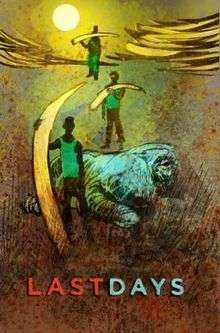Last Days (2014 film)
| Last Days | |
|---|---|
 Theatrical release poster | |
| Directed by | Kathryn Bigelow |
| Produced by | Megan Ellison |
| Written by | Scott Z. Burns |
| Edited by |
James Ryan Mike Andres |
Release dates |
|
Running time | 3 minutes |
| Country | United States |
| Language | English |
Last Days is a short film directed by Kathryn Bigelow, highlighting the danger of extinction faced by African elephants from the illegal ivory trade. The film also alleges that the poaching of elephants in Africa contributes significantly to the funding of terrorism networks.[1] The film's claims are based on a 2013 report by the Elephant Action League (EAL) that the militant organization Al-Shabaab receives as much as 40% of its funding from the sale of elephant ivory. Footage of the 2013 Westgate shopping mall attack in Nairobi, Kenya, which has been attributed to Al-Shabaab, is featured in the film.[2]
The film's claims of a poaching-terrorism link have been challenged in the media. Tristan McConnell, in an op-ed for the New York Times, describes the film as "a beguiling story divorced from reality", arguing that "global terrorism and the international ivory trade are distinct problems, requiring different strategies; conflating the two risks undermining the fight against both".[3] McConnell earlier cited a report published jointly by Interpol and the United Nations Environment Programme which found the EAL's description of a link between the ivory trade and Al-Shabaab, the basis for Bigelow's film, to be "highly unreliable".[2] The same report indicates that illegal trade in charcoal, a major cause of deforestation, is the principal source of funding for the terror group through taxes imposed on traders.[4]
Nir Kalron, the author of the investigation for the EAL, defended his organization's findings, saying "we stand 200% behind our sources and our work".[2] However, TRAFFIC, which monitors the illegal wildlife trade, has also not found any evidence that Al-Shabaab profits from the trade in ivory, according to a spokesperson. Matthew Bryden, former director of the U.N. Monitoring Group for Somalia and Eritrea, which investigates Al-Shabaab's funding sources, said also, "We saw nothing and we heard nothing about ivory, and that's strange because we were looking at the exact same smuggling routes".[2]
Because these investigations have called the film's premise into question, the human-rights group Survival International has urged that the film be withdrawn. The group's director, Stephen Corry, argues that the film encourages a militaristic approach to environmental conservation which has resulted in abuse and persecution of indigenous tribes with no connection to terrorism or organized crime.[5]
References
- ↑ Foundas, Scott (28 September 2014). "Kathryn Bigelow Decries 'Last Days' of the African Elephant". Variety. Retrieved 19 December 2014.
- 1 2 3 4 McConnell, Tristan (14 November 2014). "Illegal ivory may not be funding African terror group". USA Today.
- ↑ McConnell, Tristan (29 October 2015). "The Ivory-Funded Terrorism Myth". New York Times.
- ↑ Veríssimo, Diogo (16 January 2015). "Kathryn Bigelow and the bogus link between ivory and terrorism". theconversation.com.
- ↑ "Last Days of Ivory: Kathryn Bigelow spurns call to withdraw film" (4 November 2015). Survival International.
Further reading
- "Illegal Trade in Wildlife and Timber Products Finances Criminal and Militia Groups, Threatening Security and Sustainable Development" (Press release). United Nations Environment Programme. 24 June 2014.
External links
- Official website
- An Illusion of Complicity: Terrorism and the Illegal Ivory Trade in East Africa, Royal United Services Institute